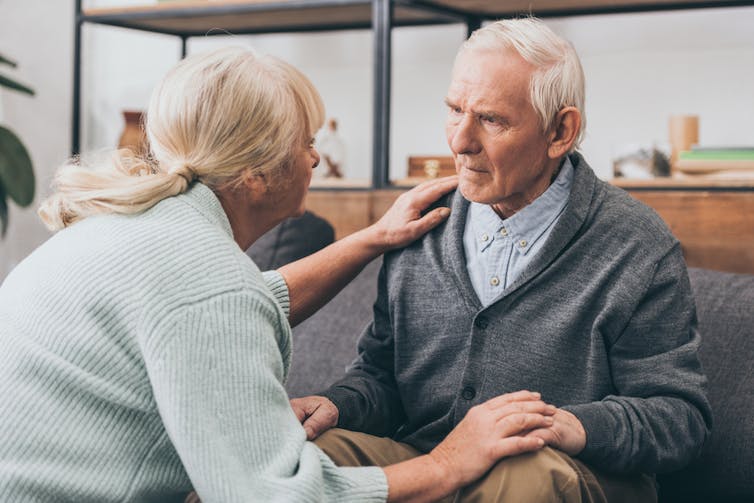
Gorodenkoff/Shutterstock
Take a look at any list of risk factors for cognitive decline and you’re bound to find “education” among them. The received wisdom is that the more years you spend in education, the lower your risk of cognitive decline in old age. Our latest research begs to differ.
Cognitive decline is not only going to impair your chess or sudoku, it can reach a point where it severely affects your everyday activities. When this happens, doctors start talking about dementia.
Incredible as it may seem, in the UK, dementia is the biggest killer. It kills more people than cancer or heart disease, and it starts with cognitive decline – a worsening in people’s ability to think, reason and remember. So finding out what causes cognitive decline is an important and urgent scientific pursuit.
Having a lower level of education has been found to be associated with a higher risk of dementia. Education is thought to allow a person to build a “cognitive reserve” – a sort of buffer against cognitive decline.
Studies have found that education is associated with a slower age-related decrease in some important cognitive skills, such as reasoning and verbal skills. However, recent findings are less encouraging.
A meta-analysis (the combined results of several related studies) found that the average effect of education on cognitive decline is zero. Interestingly, this meta-analysis highlights that the “between-study heterogeneity” – that is, how inconsistent the results are across the included studies – is substantial and largely unexplained. In a nutshell, the average effect is zero, but the results differ massively from study to study. And we do not know why.
These somewhat puzzling findings may partly stem from how the studies were designed and conducted. It can be years before cognitive decline is apparent, especially among people under 60. To reliably estimate the rate of decline, data that spans decades is needed. Only a few studies in the field have followed the participants for that long.
Our study is one of them. It includes about 2,000 Japanese adults, ranging from age 40 to 79 at the start of the study. The participants were followed for about 25 years. They were tested several times on crystallised intelligence (the ability to accumulate knowledge, facts and skills) and fluid intelligence (the ability to reason and think flexibly). My colleagues and I found that education has no influence on rates of cognitive decline in either test.
This outcome seems counterintuitive. As we have seen, more-educated people are less likely to develop dementia. So why does education have no impact on cognitive decline? After all, dementia occurs when a person is no longer cognitively functional.

LightField Studios/Shutterstock
Possible explanation
There may be two mechanisms at play. First, while education has no effect on cognitive decline, it has often been found to be associated with slightly higher baseline cognitive skills, that is, before age-related decline begins. Usually, people with higher degrees perform a bit better in cognitive tasks at the beginning of the sorts of studies that track people over many years. The same pattern of results is present in our study.
Everyone experiences a fall in cognitive function as they age. But if you start from a higher baseline, cognitive decline takes longer to reach the threshold for dementia. To a certain extent, this may account for the higher rates of dementia in people with lower educational attainment.
The other potential mechanism is probably more significant. Dementia is associated with factors such as obesity, air pollution and head injuries, and these things increase the chance of developing dementia by causing brain damage. Crucially, they are all related to education.
For example, people with higher levels of education are, on average, wealthier and so can usually afford to live in less-polluted areas. And the link between socioeconomic status and obesity is tragically well known. Finally, the more highly educated are less likely to have manual jobs, some of which come with a risk of head injury.
Education may therefore contribute to preventing dementia indirectly. While education won’t save you from cognitive decline, it may still give you an edge against dementia.
![]()
Giovanni Sala receives funding from the University of Liverpool.























